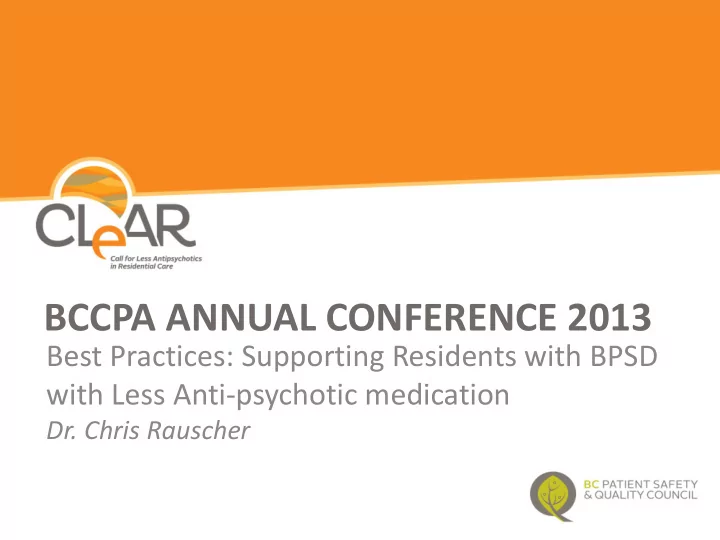

BCCPA ANNUAL CONFERENCE 2013 Best Practices: Supporting Residents with BPSD with Less Anti-psychotic medication Dr. Chris Rauscher
Objective: Highlight and discuss current practice and opportunities for improvement Agenda: - Case scenario - Experience in a care facility - An opportunity-CLeAR - Key points for an improved approach - Case scenario #2-applying tha approach - Discussion
DIGNITY CULTURE OF CARE RELATIONSHIPS AND MEETING NEEDS MEDICATION USE ANTIPSYCHOTIC MEDICATION
Culture Change: Staffing Impact Reductions in turnover and sick days Increased levels of staff satisfaction Active understanding of culture change and person-centered principles Self-motivation, critical analysis, and problem-solving by front-line staff to incorporate person-centred principles.
Culture Change: Engagement Increased levels of resident satisfaction Resident choice in daily activities and routines (measured by care plans) Increased levels of engagement (measured by MDS 3.0) Emphasis by residents and staff on relationships and community; descriptions as “home” or “family”
A Balanced Approach to Antipsychotic Medication Use
Alignment Opportunities Prov BPSD Guideline & Algorithm Implementation Shared Care Polypharmacy Clinical Care Management Medication reconciliation in residential care 48/6 in acute care Shared Care-Transitions in Care Provincial Dementia Action Plan
Antipsychotic Medication Use - Current State — Point prevalence: 35% (regular and prn) — Behind the number - considerations: Indications: (A) Psychotic conditions – Chronic: e.g., Schizophrenia (B) Psychotic conditions – Episodic: e.g., Delirium (C) Most often not psychotic – e.g., BPSD Practice gaps to balance risk-benefit: (A) Assessment-> Care plan with non-pharmacologic approaches (B) Med Rx-Initial + dosages, prns; Monitoring and review (C) Involving resident and family
“How best can we work together and support each other in our efforts to improve care?”
Attendees UBC Department of Family Practice & Capilano University MoH Medical Directors & Directors of Care at residential care facilities (province-wide) Members of Shared Care Committee – Polypharmacy Committee BCMA; College of Physicians and Surgeons Patient Voices Network WorkSafe BC Community & Acute Care Pharmacists Health Authority Administrators for Residential Care Programs (VIHA, VCH, IHA, Fraser, Providence) Alzheimer Society of BC, Advocates for Care Reform Geriatric Psychiatrists, Family Physicians & Geriatricians
Vision CLeAR will enhance the dignity of seniors in residential care who exhibit behavioural and psychological symptoms associated with dementia by working collaboratively with facilities throughout BC to provide care that is individualized, non-pharmaceutical and evidence-based.
Call for Less Antipsychotics in Residential Care A voluntary quality improvement initiative designed to support interested teams in their efforts to address BPSD (within the context of Ministry and health authority priorities, policies and initiatives) Enhanced support to achieve goals for work already underway vs new work being created Build capability and capacity for improvement in residential care Bring system together to create vision of what we can achieve
What Does This Look Like?
Our Aim Achieve a 50% reduction from baseline in the inappropriate use of antipsychotics through evidence-based management of the behavioural and psychological symptoms of dementia for seniors living in residential care by December 31, 2014.
Principles for Working Together — Emphasis on community, collaboration & effective communication — Multi-disciplinary care teams — Collection and sharing of data — Drawing upon evidence to support decision-making — Setting realistic and achievable goals that align with existing initiatives — Engaging residents, families and the public in opportunities for improvement — Honouring the local context in which work is done
How Can You Be Involved? 1. Action & Improvement Team: Staff from care facilities, physicians, pharmacists, HA supports, residents/families, others as identified – Receive improvement coaching – Participate in learning opportunities – Collect data to measure improvement – Residential care facility-level and multi-disciplinary in nature 2. Organizational Partner: provides overarching direction and collaboration to the initiative – Receive information resources – Participate in online learning opportunities 3. Individual Member: may not be part of a local team but wish to be connected, participate in webinars, etc. – Receive information resources – Participate in online learning opportunities
Area of Focus for Improvement 1. Medication Reviews 2. Care Planning 3. Teamwork & Communication 4. Behaviour Management (PIECES)
Proposed Activity Plan – first wave Call to Action (early June) Information Calls (June 18, 25 & July 9) Team Enrollment Deadline (August 30) Call to Action Kick-Off (In-person) (October 9) Online Webinars (monthly) Site Visits / Coaching for Teams CME for Physicians & Pharmacists
Recommend
More recommend